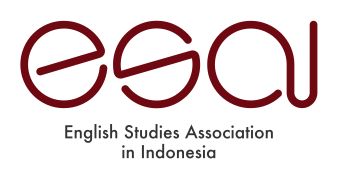NATIVESPEAKERISM AND WORLD ENGLISHES: TEACHERS PERCEPTION TOWARDS NON-NATIVE ENGLISH VARIETIES
Abstract
In the last decade, the development of information technology confirms English as a Lingua Franca used by native English speakers and nonnative English speakers. English in a global context has triggered the emergence of new English variants, resulting from the assimilation of English into a local language known as World Englishes. On the other hand, Teaching English as a Foreign Language (TEAFL) in Indonesia is still oriented towards the ideology of nativespeakerism which believes that TEAFL should be done by Native English-Speaking Teachers (NEST) because they are believed to have better linguistic competence and contextual understanding than Nonnative English-Speaking Teachers (NNEST). This article is directed to determine the perceptions of English teachers in Indonesia regarding the world Englishes phenomenon. This research is qualitative research with 20 informants consisting of 10 Nonnative English-Speaking Teachers and 10 Native English-Speaking Teachers. Four Focus Group Discussions (FGDs), each consisting of 5 informants, will be conducted to gather as much information as possible related to teachers’ perceptions. This research is expected to provide an overview of foreign language teaching in Indonesia. The results showed that nativespeakerism has a strong correlation with the world Englishes phenomenon. In the Indonesian context, this is shaped by the stigma that forms in society. This research is expected to enrich teaching studies, specifically in teaching foreign languages.
Keywords
Full Text:
PDFReferences
Bakshi, R. K. (1991). Indian English. English Today, 73(27)
Balasubramanian, C & Abu Radwan. (2018). New English Norms: A Reality or an Intellectual ideal? Journal of Arts and social Sciences.
Bauer, I. (1989). The verb have in New Zealand English. English World-Wide. 10
Baumgardner, R. (1996). Pakistani English: Acceptability and the norm. World Englishes. 14.
Baxter, J. (1991). How Should I Speak English? American-ly, Japanese-ly, or internationally?” Teaching English Pronunciation: a Book of Readings. Ed. Adam Brown. London: Routledge.
Campbell, D. (1983). Peansiri Ekniyom, Anjum Haque, and Larry Smith. English in International Settings: Problems and Their Causes. Readings in English as an International Language. Oxford: Pergamon Press.
Crystal, D. (2003). English as a Global Language. Cambridge: Cambridge University Press.
Erling, E. J. (2005). The many names of English. English Today, 21(1). 40-47.
Guerra, L (2014). Using Translation to Teach Native and Non-native Varieties of International English. e-TEALS: An e-journal of Teacher Education and Applied Language Studies.
Gisborne, N. (2000). Relative clauses in Hong Kong English. World Englishes, 19.
Holliday A. (2005). The struggle to teach English as an international language. Oxford: Oxford University Press.
Holliday, A. (2006). Native-Speakerism. ELT Journal, 60(4), 385–387.
Hosali, P. (1991). Some syntactic and lexico-semantic features of an Indian variant of English. Central Institute of English and Foreign Languages Bulletin, 3(1-2), 65-83.
Jenkins, J. (2015). Repositioning English and multilingualism in English as a Lingua Franca. English in Practice, 2(3), 49-85.
Kirkpatrick, A. (2007) World Englishes: Implications for International Communication and English Language Teaching. Cambridge: CUP.
Kubota, R. (2001). Discursive construction of the images of US classrooms. TESOL Quarterly, 35(1), 9-37.
Modiano, M. (2001). Ideology and the ELT Practitioner. International Journal of Applied Linguistics
Mukherjee, J. & Schilk, M. (2009). Exploring variation and change in New Englishes: Looking into the International Corpus of English and beyond. In Vevalainen T. & Traugott E (eds.) The Oxford Handbook of the History of English. Oxford: Oxford University Press.
Pennycook, A. (1994). The cultural politics of English as an international language. London: Longman.
Pennycook, A. (2002). Development, culture and language: ethical concerns in a postcolonial world. Proceedings of the 4th International Conference on Language and Development.
Rajagopalan, K. (2012). ‘World English’ or ‘World Englishes’? Does it make any difference? International Journal of Applied Linguistics, 22(3).
Rivers, D. (2017). Native-speakerism and the betrayal of the native speaker teaching professional. In D. J. Rivers & K. Zotzmann (Eds.), Isms in language education: Oppression, intersectionality and emancipation. Berlin: De Gruyter.
Ren, W., Chen, Y. & Lin, C. (2016). University students’ perceptions of ELF in mainland China and Taiwan. System, 56, 13-27.
Silalahi, R. M. P. (2019). Linguistic Imperialism: Native-Speakerism from The Perspective of Non-Native English Learners. Journal of ELT Research: The Academic Journal of Studies in English Language Teaching and Learning, 4(1), 73-84.
Wang, Y. (2016). Native English speakers’ authority in English. English Today, 125(32), 35-40.
DOI: http://dx.doi.org/10.30813/jelc.v11i2.2609
Refbacks
- There are currently no refbacks.



2.jpg)



